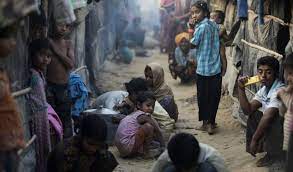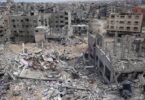Dr. Azeem Ibrahim
The world has witnessed numerous instances of conflict and humanitarian crisis, each with its own unique set of circumstances and complexities. Among these, the Rohingya crisis in Myanmar and the Palestinian issue in the Middle East have garnered significant attention due to their protracted nature and the plight of the affected communities.
Both the Rohingya and the Palestinians have a long history marked by political unrest, discrimination and marginalization. The Rohingya, an ethnic minority group residing in Myanmar’s Rakhine State, have faced systemic persecution and denial of citizenship since the 1982 Citizenship Law stripped them of their rights. Similarly, Palestinians have experienced dispossession and displacement since the establishment of the state of Israel in 1948, which resulted in the displacement of hundreds of thousands of Palestinians. Olivier De Schutter, the UN special rapporteur on extreme poverty and human rights, recently highlighted the urgent need to address the situation of nearly 1 million Rohingya residing in overcrowded camps in Cox’s Bazar, Bangladesh. He warned that Rohingya refugees in Bangladesh face a fate similar to that of the Palestinians, as they find themselves trapped in an enduring and increasingly neglected crisis. He asserted that granting them the right to work in their host country is essential, as relying solely on diminishing international aid is unsustainable.
De Schutter, who recently visited Cox’s Bazar, described the conditions as “absolutely terrible” and recounted encountering people in a state of profound desperation. The refugees, who fled the brutal military crackdowns in Myanmar in 2017, are isolated from the local community and endure squalid and cramped living conditions. While the international community expressed outrage over the violence inflicted upon the Rohingya more than five years ago, the focus has now shifted to other crises, leaving the refugees increasingly neglected. The World Food Programme’s recent announcement that it had slashed the food allowance for Rohingya refugees to a mere $8 per person per month due to insufficient funding exacerbates the dire situation. De Schutter warns that, when combined with rising food prices, this reduction in support will lead to a significant deterioration in calorie intake and nutritional quality for the refugees. Moreover, child malnutrition and undernutrition rates will soar, perpetuating the problem of stunted growth among children.
Most concerning is the fact that these vulnerable individuals are entirely dependent on humanitarian assistance, while being prohibited from engaging in any form of work. They find themselves utterly trapped in their circumstances, unable to improve their situation or become self-reliant, exacerbating their plight. The UN’s warning draws attention to the parallels between the Rohingya refugees in Bangladesh and the long-standing struggles of the Palestinians. The urgent call to address this neglected crisis emphasizes the importance of granting the Rohingya the right to work and supporting them in their quest for self-sufficiency. Without concerted efforts to address their predicament, these individuals face a future marked by ongoing dependence on humanitarian aid and a deterioration in their overall well-being. A key striking similarity between the Rohingya and the Palestinians is the forced displacement they have endured. The Rohingya have faced several waves of mass exodus due to violent military crackdowns, such as the 2017 crisis that led to an estimated 1 million Rohingya fleeing to neighboring Bangladesh. Palestinians, too, have endured multiple waves of displacement, starting with the Nakba in 1948, which resulted in the displacement of hundreds of thousands of Palestinians from their homes and the establishment of refugee camps in neighboring countries.
Another key similarity is how the Rohingya and Palestinians face significant challenges in their quest for statehood and self-determination. The Rohingya, despite their long-standing presence in Myanmar, have been denied citizenship and face severe restrictions on their movement and access to basic services. Similarly, Palestinians have struggled to establish an independent state, namely because of Israel’s occupation of Palestinian land, illegal Israeli settlements being built on Palestinian land, and the inability of the international community to step in and to mediate effectively a final resolution to the conflict. Both peoples share a common history of disenfranchisement after the collapse of colonial rule and imperial regimes. In both Myanmar and Israel, the governments have attempted to uproot them from their land, portraying them as foreigners without legitimate claims. Rewriting their historical narratives, both persecuted groups have been labeled as nonexistent ethnicities, interlopers and invaders. Religious justifications have been employed to support the persecution of both groups. The Myanmar government has empowered Buddhist nationalist factions that promote genocide against the defenseless Rohingya, while the Israeli government has empowered Jewish nationalist factions that support the ethnic cleansing of Palestinians.
The international response to the Rohingya crisis and the Palestinian issue has also been a subject of debate and criticism. In both cases, the international community has struggled to find effective solutions, with limited political will and complex geopolitical dynamics hindering progress. Calls for accountability, justice and humanitarian aid have been voiced, but meaningful action to address the root causes of these crises has been limited. Both the Rohingya and the Palestinians have faced grave human rights violations. The Rohingya have reportedly been subjected to widespread instances of extrajudicial killings, sexual violence and the destruction of their homes and villages. Palestinians have also experienced a range of human rights abuses, including restrictions on movement, land confiscation and incidents of violence. These violations highlight the urgent need for international intervention and the protection of human rights for both communities. The Rohingya and Palestinians share several similarities in their historical context, forced displacements, struggles for statehood and the international community’s response. Both communities have endured prolonged conflicts, faced severe human rights abuses and sought recognition and justice. It is crucial for the international community to recognize these parallels, raise awareness about their plights and work toward finding lasting solutions that uphold human rights, justice and the right to self-determination for both the Rohingya and the Palestinians. Only through concerted efforts can we hope to bring an end to their suffering and secure a more peaceful and just future for these marginalized communities.







